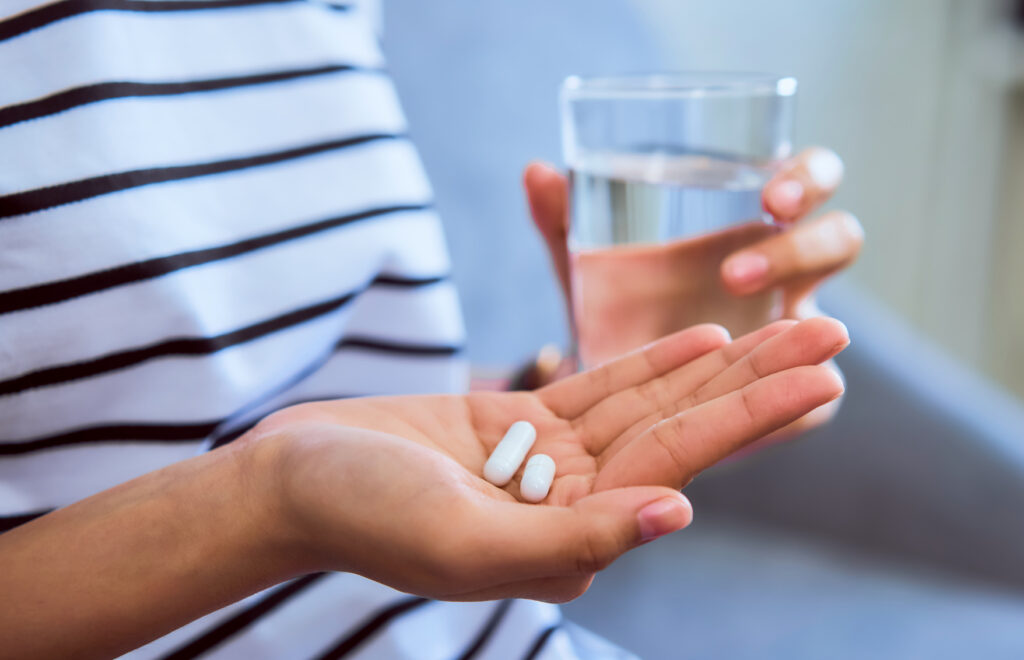As women, we want to do it all. Whether we’re juggling kids, a full time job, or just trying to survive in a culture that’s rampant with overwork, life can feel overwhelming. Unfortunately, in their attempt to accomplish and achieve, women will sometimes turn to Adderall. Below, we’ll shed light on why women use Adderall, exploring its side effects, interactions with female hormones, and particular considerations during menopause, while also addressing the concerns surrounding addiction and how to seek help.
What is Adderall?
Adderall is a prescription stimulant composed of amphetamine and dextroamphetamine. It belongs to a class of drugs known as central nervous system stimulants, which work by increasing neurotransmitter activity in the brain, specifically dopamine and norepinephrine. This action helps improve focus, attention, and control behavior, which can lead to productivity.

What is Adderall Used For?
While Adderall is primarily prescribed to treat Attention Deficit Hyperactivity Disorder (ADHD), it’s increasingly used to manage narcolepsy and certain cases of treatment-resistant depression. In women, its use extends to managing ADHD symptoms, which can manifest differently compared to men, often characterized by inattentiveness, disorganization, and overwhelmed feelings rather than hyperactivity.
However, people might use Adderall without a prescription for several reasons, often because of misconceptions about its effects or underestimating the risks associated with unsupervised use. Here are some common reasons for non-prescribed use of Adderall:
- Enhanced Focus and Productivity: Many people, especially students or professionals under high pressure, believe Adderall can help them focus better, study for longer periods, and enhance productivity or performance. This is because Adderall increases dopamine levels in the brain, which can improve attention and focus.
- Weight Loss: Adderall has appetite-suppressing properties, leading some individuals to use it as a quick-fix solution for weight loss. This use is particularly risky and can have serious health implications.
- Euphoric Effects: The increased dopamine activity caused by Adderall can also create a feeling of euphoria, making it attractive for recreational use.
- Misunderstanding of Safety: Some people believe that because Adderall is prescribed by healthcare professionals, it’s safe to use under any circumstances. They might not recognize the potential for dependence, addiction, or the serious side effects associated with misuse.
Side Effects of Adderall in Females
The side effects of Adderall, while shared across genders, can impact women in unique ways due to differences in body chemistry, hormonal fluctuations, and the menstrual cycle.
Long-Term Effects
Long-term use of Adderall in females can lead to an increased risk of cardiovascular issues, mental health problems such as depression and anxiety, and potential for substance misuse or dependency. Additionally, chronic use might contribute to a decrease in bone density, an important consideration for women’s health.
Short-Term Effects
Short-term side effects include increased heart rate, appetite suppression, insomnia, and anxiety. Women may also experience heightened stress levels and mood swings correlating with hormonal cycles.
Sexual Side Effects of Adderall in Women
These sexual side effects, while not universally experienced, can affect some women’s sexual health and satisfaction. These effects result from Adderall’s impact on dopamine levels, a neurotransmitter involved in pleasure and reward pathways.
Here are the primary sexual side effects of Adderall use in women:
- Decreased Libido: One of the most commonly reported sexual side effects of Adderall in women is a reduced sex drive or libido. The medication can decrease sexual desire, making individuals less interested in sexual activity.
- Difficulty Achieving Orgasm: Adderall can make it more challenging for some women to achieve orgasm. This difficulty is due to the drug’s effects on neurotransmitters in the brain, which can interfere with the body’s natural arousal and orgasm processes.
- Changes in Arousal: Some women may experience changes in their level of sexual arousal. This can include both a decrease in arousal, making it harder to become sexually excited, or in some cases, an increase, leading to heightened sensitivity.
Adderall and Female Hormones
Adderall can interact with female hormones in complex ways, potentially exacerbating symptoms of hormonal imbalance. While research is ongoing, understanding these interactions is crucial for personalized medical advice and treatment plans.
Adderall and Menopause
During menopause, women experience significant hormonal changes that can affect the efficacy and side effects of Adderall. Some may find their ADHD symptoms worsen, while others might become more sensitive to Adderall’s side effects, necessitating adjustments in their treatment plan.
Does Adderall Increase Estrogen Levels?
Current research does not definitively show that Adderall directly increases estrogen levels. However, its interaction with the endocrine system suggests that its use can indirectly affect hormonal balance, emphasizing the need for careful monitoring in women.
How to Get Help
If you or someone you know is struggling with Adderall use or dependency, it’s crucial to seek professional help. At Her Harbor, we understand the unique challenges women face in today’s fast-paced world, including the pressures that might lead to Adderall dependence. We believe in providing a sanctuary where women can seek trauma-informed care and heal in an environment tailored to their specific needs.
Our comprehensive approach to treatment goes beyond addressing the physical aspects of dependence; we dive deep into the emotional and psychological realms, offering drug detox, therapy, support groups, connections to local sober living homes, and personalized care plans designed to empower our clients. Here, you’re not just another client; you’re a vital member of a community that values your well-being and independence. We specialize in understanding the interplay between Adderall use and female hormones, the impacts on mental health, and the unique societal pressures women face. Choosing Her Harbor means opting for a path of recovery that’s mindful of your entire being—body, mind, and spirit. Start the journey with us.
Frequently Asked Questions About Adderall Usage in Women
What does Adderall do for women with ADHD?
Adderall helps increase concentration, focus, and control over impulses and can be particularly effective for women whose ADHD symptoms include inattention and disorganization.
Who should not take Adderall?
Individuals with a history of heart disease, hyperthyroidism, glaucoma, or a predisposition to substance misuse should avoid Adderall. Pregnant and breastfeeding women should also consult their doctor.
What are the side effects of Adderall on your stomach?
Adderall can cause gastrointestinal issues such as nausea, stomach pain, and weight loss due to appetite suppression.
Does Adderall affect fertility in females?
There is limited research on Adderall’s impact on fertility. Women planning to become pregnant should discuss potential risks with their healthcare provider.
Is Adderall safe for women to take?
Yes, when prescribed by a healthcare provider and taken as directed, Adderall can be safe and effective for women. However, individual health factors must be considered.
Are there any specific considerations for women taking Adderall?
Women should consider hormonal fluctuations, potential pregnancy, and specific side effects like bone density reduction when taking Adderall.
Can Adderall interact with other medications or supplements commonly used by women?
Yes, Adderall can interact with various medications and supplements, including birth control pills, impacting their effectiveness. Always consult a healthcare provider when starting new medications or supplements.
Can Adderall affect menstrual cycles or hormonal balance in women?
Some women report changes in their menstrual cycle and hormonal symptoms while taking Adderall, though more research is needed.

Haley Sample is a dedicated and experienced registered nurse with a robust background in healthcare and leadership. Her professional journey includes significant contributions to various medical institutions, showcasing her expertise and commitment to patient care. Her leadership skills, marketing acumen, and dedication to patient care make her a valuable asset in the healthcare industry.
